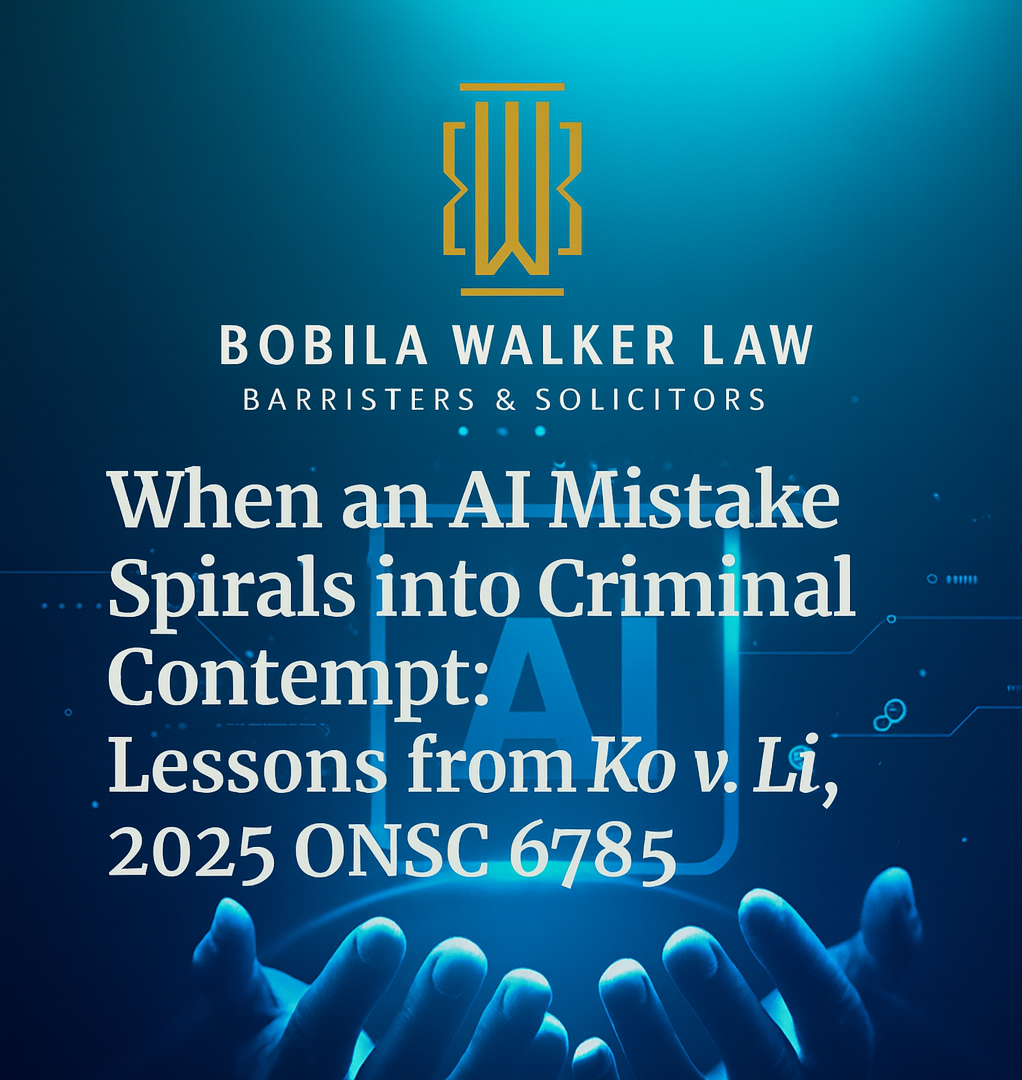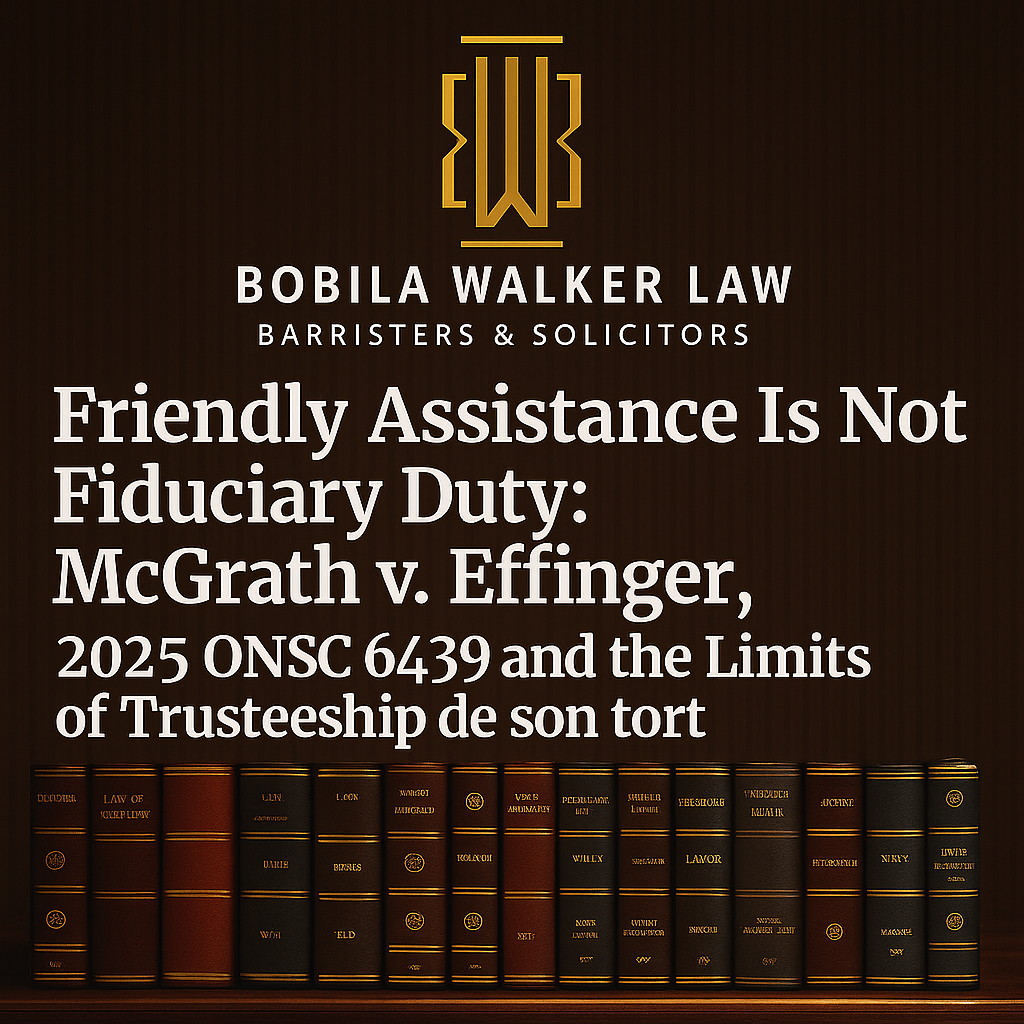Ferritto v. Ferritto: Key Insights from the 2025 ONSC Costs Decision on Guardianship Litigation
Introduction
The recent Ontario Superior Court of Justice decision in Ferritto v. Ferritto et al., 2025 ONSC 4217, provides critical insights into guardianship disputes, costs awards, and the consequences of misconduct in estate litigation. Released on July 17, 2025, this costs decision by Justice L. Sheard addresses a contentious family dispute involving allegations of undue influence and financial mismanagement. This blog post breaks down the case, its implications, and key takeaways for those navigating similar legal battles.
Estate disputes, including capacity litigation, fall under the general civil litigation costs framework set by section 131 of the Courts of Justice Act and Rule 57 of the Rules of Civil Procedure. The “loser pays” principle encourages discipline and accountability, requiring parties to evaluate their potential cost exposure before pursuing a lawsuit or motion. This is especially critical in estate litigation, where emotional dynamics can escalate. Parties must not view the estate or an incapable person’s assets as an endless funding source for litigation. Contested guardianship applications risk losing focus on benefiting the incapable person, often turning into sibling conflicts. Courts must assess whether the litigation provided any benefit to the incapable person when determining who bears the costs, ensuring a degree of reasonableness in the decision to litigate.
Case Background
The Ferritto case originated from two consolidated applications, Court File Nos. CV-21-77215 and CV-22-79264, centered on Lucia Ferritto, an incapacitated individual. Edi Ferritto, the plaintiff, sought to be appointed guardian of her mother Lucia’s property and person, while her brother, Alfredo Ferritto, acted as Lucia’s purported attorney for property. The litigation exposed serious allegations against Alfredo, including misuse of Lucia’s assets, which led to his arrest in February 2023. In February 2023, Justice Krawchenko appointed the Public Guardian and Trustee (PGT) as Lucia’s Guardian of Property and arranged for Section 3 Counsel under the Substitute Decisions Act, 1992. The “Krawchenko Decision” on October 4, 2023, ordered both Edi and Alfredo to pass their accounts, dismissed Alfredo’s application, and directed a trial for unresolved issues. A five-day trial, spanning November 2024 to April 2025, culminated in Justice Sheard’s judgment on June 2, 2025, which fully favored Edi, restoring Lucia’s estate plans and invalidating documents influenced by Alfredo.
Key procedural milestones:
February 2023: Justice Krawchenko appointed the Public Guardian and Trustee (PGT) as Lucia’s Guardian of Property and arranged for Section 3 Counsel under the Substitute Decisions Act, 1992.
March 2023: A hearing resulted in the “Krawchenko Decision” (October 4, 2023), ordering both Edi and Alfredo to pass their accounts and directing a trial for unresolved issues.
November 2024–April 2025: A five-day trial before Justice Sheard concluded with a judgment on June 2, 2025, fully in Edi’s favor, restoring Lucia’s estate plans and setting aside documents influenced by Alfredo.
The Costs Decision
Edi sought $283,827.13 in legal fees and disbursements, requesting full or substantial indemnity due to Alfredo’s alleged “reprehensible, scandalous, and egregious” conduct. Justice Sheard awarded costs as follows:
Trial-Related Costs: $78,652.80 (substantial indemnity at 90%) for trial-related fees, reflecting Alfredo’s blameworthy conduct, including undue influence over Lucia.
Applications and Motions Costs: $72,374.58 (partial indemnity at 65%), as the earlier Krawchenko Decision did not find Alfredo’s litigation conduct reprehensible.
Disbursements: $18,988.48 plus HST, covering essential expenses like capacity assessments and translation services.
The court reduced certain claimed fees, notably $27,577.50 for a default judgment motion, as Edi’s assumption that a trial was unnecessary was incorrect given the need for viva voce evidence.
Key Legal Principles
The decision reinforces several principles in costs awards:
Costs Follow the Event: Under s. 131(1) of the Courts of Justice Act, the successful party (Edi) is presumptively entitled to costs.
Substantial Indemnity for Misconduct: Alfredo’s pre-litigation actions, including isolating Lucia and manipulating her estate plans, justified substantial indemnity costs for the trial.
Reasonable Expectations: Costs must be fair and reasonable, balancing indemnification with the unsuccessful party’s expectations (Boucher v. Public Accountants Council, 2004 ONCA).
Discretionary Reductions: The court disallowed fees for steps where Edi’s strategy (e.g., pursuing default judgment) was misguided.
Implications for Guardianship and Estate Litigation
Undue Influence in Estate Planning: The case highlights the courts’ vigilance in protecting vulnerable individuals from undue influence, particularly in guardianship disputes.
Importance of Viva Voce Evidence: The requirement for a trial, despite Alfredo’s default, underscores the need for oral evidence to resolve complex issues like document validity.
Costs as a Deterrent: Elevated costs awards serve to discourage misconduct and frivolous litigation tactics, as seen in Alfredo’s delay strategies.
Financial Burden of Litigation: The significant costs ($283,827.13 claimed) emphasize the need for efficient dispute resolution in family and estate matters.
Practical Takeaways
Seek Early Legal Advice: Guardianship disputes can escalate quickly, requiring skilled counsel to navigate complex issues like capacity and undue influence.
Document Evidence Thoroughly: The absence of evidence from the lawyer who drafted challenged documents necessitated a trial, increasing costs.
Consider Settlement: Prolonged litigation, as seen in this three-and-a-half-year case, can lead to substantial financial and emotional costs.
Understand Costs Risks: Parties engaging in blameworthy conduct risk higher cost awards, as Alfredo did here.
Conclusion
Ferritto v. Ferritto et al., 2025 ONSC 4217, serves as a cautionary tale for those involved in guardianship and estate disputes. The decision underscores the judiciary’s commitment to protecting incapacitated individuals and penalizing misconduct through costs awards. For families facing similar issues, this case highlights the importance of transparency, ethical conduct, and strategic litigation to minimize costs and achieve just outcomes.
For more information on guardianship or estate litigation in Ontario, consult our qualified estates lawyers at Bobila Walker Law to ensure your rights and interests are protected.
Keywords: Ferritto v. Ferritto, 2025 ONSC 4217, guardianship litigation, estate disputes, costs decision, undue influence, Ontario Superior Court, substantial indemnity costs, Public Guardian and Trustee.





